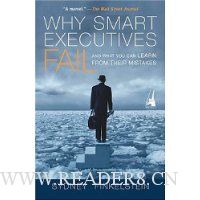
基本信息出版社:Portfolio Trade
页码:336 页
出版日期:2004年05月
ISBN:1591840457
条形码:9781591840459
版本:2004-05-25
装帧:平装
开本:32开 Pages Per Sheet
外文书名:从辉煌到湮灭——聪明经营者为何阴沟里翻船
内容简介 Book Description
It’s an all too common scenario: A great company breaks from the pack; the analysts are in love, the smiling CEO appears on the cover of BusinessWeek and Fortune, the stock soars. Two years later, the company is in flames, the CEO is under attack, and the stock has tanked.
Why does this sort of thing keep happening at respectable companies like Motorola, Quaker, and Sony, all of which have very smart, hard-working senior executives? And how can you tell if it’s about to happen at your own company?
Why Smart Executives Fail answers these and many more crucial questions. Sydney Finkelstein, a distinguished professor at Dartmouth’s Tuck School of Business, carried out a six-year study of leadership failure, the largest of its kind. After hundreds of interviews with insiders at top companies that got into major trouble—such as GM, Mattel, and RiteAid—Finkelstein figured out the common causes behind failures in wildly different types of companies. He explains “the seven habits of spectacularly unsuccessful people” that drive smart managers to make catastrophic mistakes.
As much about psychology as it is about business, Why Smart Executives Fail tells the stories of more than fifty great business disasters and includes exclusive interviews with many of their leaders, in which they explain what really led to their disastrous decisions.
From Publishers Weekly
Is there a more timely topic for a business book than brilliant executives running their companies into the ground? Dartmouth business professor Finkelstein has been on the case for six years, researching how otherwise intelligent people can manage to botch things up. Here, he dredges up old corporate screwups (like R. J. Reynolds's smokeless cigarettes) and new ones, too (WorldCom and Tyco, among others). There's a certain amount of schadenfreude involved, as the author crisply and incisively picks apart disaster after disaster, but the lessons drawn from this lengthy study are, for the most part, vastly unsurprising. While each company profiled tends to fail in its own way, there are common traits among top execs, such as a propensity to eliminate "anyone who isn't 100 percent behind them" and to "underestimate major obstacles." While Finkelstein suggests avoiding such destructive behaviors, the truth is, sometimes it's human nature to be blind to one's own weaknesses. And that's a mystery no book can fully deconstruct.
Book Dimension
length: (cm)21.1 width:(cm)13.8
作者简介 Sydney Finkelstein is Steven Roth Professor of Management at Dartmouth’s Tuck School of Business. His writing has appeared in the Harvard Business Review and other business journals.